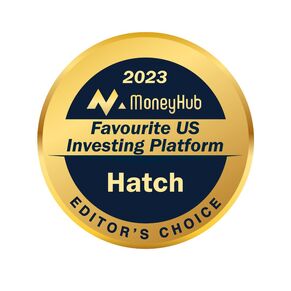Hatch vs Stake - Which one is best for you?
Read, learn, and compare Hatch and Stake with help from MoneyHub's financial experts. Let us help you pick the best investment platform.
Updated 14 July 2024
If you’re comparing New Zealand-operated online brokerage Hatch with Australian-based Stake, our guide walks you through the differences that matter. In this guide, we explain:
Know This First:
If you’re comparing New Zealand-operated online brokerage Hatch with Australian-based Stake, our guide walks you through the differences that matter. In this guide, we explain:
- What is Hatch?
- What is Stake?
- Similarities
- Fees: Who is Cheaper - Stake or Hatch?
- Key differences
- Final thoughts
Know This First:
- All dollar ($) values below are expressed in USD, which is the functional currency of Hatch and Stake by way of trading and fees.
- Hatch and Stake only offer trading in US stocks and ETFs. If you're looking to make an investment in New Zealand companies, please read our guide to Sharesies, InvestNow and our general how to invest in shares guide.
Want to compare Sharesies with Hatch and Stake for US Shares? Visit our Sharesies vs Hatch vs Stake Guide
Related Comparison: Sharesies vs Tiger Brokers (NZ)
|
Read our comprehensive Hatch Review
Best For
|
Read our comprehensive Stake Review
Best For
|
What is Hatch?
- Hatch is the first New Zealand-owned web platform to offer easy access to US-listed stocks and ETFs through your own individual US brokerage account, meaning you directly own your shares.
- The platform has grown in popularity, with a surge during the pandemic, reaching a milestone of over 100,000 New Zealand-based customers. Hatch has also released a Kids Investment Accounts with a reduced fee structure.
- Hatch offers over 5,800+ investing opportunities, fully supported by its Wellington team, via email, live chat and phone support. Hatch charges simple fees that are easy to follow, and they don’t take a percentage cut of your profits - it’s always 3 USD to buy or sell up to 300 shares (0.1c each share thereafter).
- Hatch is providing a full featured and intuitive investing experience for beginners through to experienced investors, with a useful investor FAQ section explaining complex investing terms and making financial jargon easy to understand, as well as a Getting Started Course which helps beginner investors learn everything they need to know to get started in only 10 minutes a day for 10 days.
What is Stake?
- Stake is a full suite brokerage with app and web. It serves anyone accessing the US market with full functionality (all order types, day trading) and has over 500,000+ customers worldwide.
- It offers 9,500+ shares and ETFs. Per Stake's founding team, 77% of their investors have bought and sold shares before, so it appears to appeal to experienced investors.
- Launched in 2017 in Sydney, Stake was created by a small team, one of whom has worked as an equities trader in the US.
- Stake offers specific features such as extended hours trading, an education academy and a paid Black service where investors can, among other benefits, trade instantly on unsettled funds.
Hatch vs Stake: The Similarities
- Both platforms only allow funding from your NZD bank account. Hatch requires a bank transfer, whereas Stake accepts bank transfers, credit card, debit card, Google Pay, Apple Pay and POLi transfers. You can't fund your trading account with a debit or credit card.
- Both use the same broker: Both access the US share markets via their partner DriveWealth, a US-regulated broker-dealer.
- Investing opportunities: Stake offers 9,500+ stocks and ETFs, Hatch offers 5,800 stocks and ETFs. Stake offers access to nearly double of what you have with Hatch.
- NZ Financial Services Provider Registrations: Stake and Hatch are both registered (you can search for the details on the FSP website).
- Stop Orders: Hatch and Stake both offer all order types (market, limit and stop). These order types let you manage your portfolio dynamically while you sleep. For example, you can elect to to buy or sell a share once the price of the share reaches a specified price. If markets move overnight, you don't need to be awake to take advantage. Please note that stop losses can only be for full shares, (e.g. if you have 1.3 shares, you can only set a stop loss for the 1 share, not the 0.3 fractional share).
- Connection to Sharesight: Hatch and Stake both partner with fellow Wellington-based company, Sharesight, to make portfolio and tax reporting super simple and easy, for both under and over $50,000 USD invested, including FIF rule implications.
- Support: Hatch has support online and via phone call back between the hours of Monday to Friday, 9am to 5:30pm. Their FAQs/help centre are thorough and in our experience the live chat and email replies were very responsive. Hatch has notified our research team that their New Zealand-based team is commonly found to be monitoring support channels well outside of those hours too). Stake offers arguably superior support with an Auckland phone number as well as a message service operating between around 11:30am and 6:30pm NZ time.
- Access to new listings: Hatch and Stake make new listings available to all customers immediately.
- Both offer protection. If either Hatch or Stake decide to shut down, you’d be given significant notice to sell up and get your money out, or transfer your shares from DriveWealth to a different US broker. In the case of a DriveWealth insolvency, under US regulation, your cash and securities flow back to you in the event of a liquidation. DriveWealth also has protections in place in the US, such as Securities Investor Protection Corporation (SIPC). Each customer account is insured for up to $500,000 (with a maximum of $250,000 in cash).
Fees: Who is Cheaper - Stake or Hatch?
It’s hard to directly compare the fees because of the different price structures. This table compares Hatch and Stake's fee schedule side by side.
| Fee | Hatch | Stake |
|---|---|---|
| Ongoing Membership Fee | None | Optional NZ$15/month for additional features such as day trading on unsettled funds, priority customer support, analyst ratings and price targets |
| Deposit FX fee | 0.5% on the interbank rate, no minimum | 1% on the interbank rate, $2 minimum fee |
| Withdrawal FX fee | 0.5% on the interbank rate, no minimum | 1% on the interbank rate, $2 minimum fee (with a minimum $10 withdrawal amount) |
| Brokerage fee | $3 flat fee to buy and sell up to 300 shares (then it’s $0.01 a share) for all order types (limit, market, stop-loss) | $3 per US trade up to $30,000, or 0.01% per US trade $30,000 or greater |
| Customer support | Free and unlimited - phone call back, and online | Free and unlimited - local phone number and email |
| Regulatory fees | $0 - Hatch absorbs these | SEC fee: $0.231 per US$10,000 of sale proceeds, TAF fee: $0.0001119 per share with a per-transaction cap of $5.95 |
| W-8BEN filing fee | $1.50 | $5 |
Know this first: The fees charged by Hatch increase the more shares you trade (after 300 shares, the fee is 1 cent/share). Our examples explain the costs in detail (we have excluded the SEC and TAF fee, which for most trades won't be more than a few cents). The most popular stocks aren’t penny stocks, so we’ll use top traded stocks to compare the pricing differences:
Going head to head:
Our view: It's an easy comparison to make. With the trade fees the same, Hatch is cheaper.
- If you trade in Apple (APPL) at $126.85 a share, a $1,000 trade buys you 7.88 shares. With Hatch you’d pay $8 to buy this based on a 3 USD order and a 0.5% exchange fee. With Stake you’d pay $13, with a $3 trade fee and a 1% exchange fee.
- If you trade Microsoft (MSFT) at $200/share, a $600 trade buys 3 shares. With Hatch, the trade fee is $3. If you sell them again for $200/share, you'll incur another $3. This is the same with Stake, but if you exchange your USD to NZD then Stake's foreign exchange fee is 1.00% whereas Hatch's is 50% lower at 0.50%.
- If you take a $10,000 position in Meta (META), you'll hold around 75 shares. Hatch's and Stake's trade fee are both $3.
- Important: Hatch does not allow penny stock investing; companies on their platform must reach certain requirements before being listed, such as: the company or ETF is listed on the NYSE or NASDAQ, the share price must be above USD 1. For companies, the market capitalisation should be greater than USD 1 billion; if market capitalisation is below USD 1 billion, Hatch may be able to request the company if the 3-month average daily dollar volume is greater than USD 0.5 million. Therefore it’s rare that normal long-term investors would significantly be affected by the 1c per share cost over 300 shares (after the USD 3 per trade fee) unless you were trading large volumes of shares from smaller priced companies.
Going head to head:
- The 1% FX fee charged by Stake is double what Hatch charges. This makes Stake far less competitive when funding USD from NZD and then on the translation back to NZD.
Our view: It's an easy comparison to make. With the trade fees the same, Hatch is cheaper.
Hatch vs Stake: The Key Differences
- Monthly charge: Hatch and Stake don't charge any ongoing membership fees. Stake offers Stake Black (aimed at experienced investors) for a monthly fee, outlined in our Stake review.
- Stock selection: Both Hatch and Stake run on similar infrastructure, and the number of available investment opportunities are fairly equal between platforms. Stake has around 200 (9,500+ vs 5,800+) investment options - e.g. stocks and ETFs.
- Ownership: Hatch is owned by FNZ, a Wellington-based Fintech company. Stake is Australian-based and privately owned, having raised A$40m in May 2021 to expand.
- Sign-up bonus: Stake offers a free share when new investors sign up and fund their account within 24 hours. The share will either be Nike, Dropbox or GoPro. Hatch also offers a sign up bonus of a $20 top-up if you make an initial deposit of $100 NZD or more (sign up using this link).
- Features: The platforms are fairly similar; both offer market orders and fractional shares free of charge. Hatch offers limit orders as part of their $3 trade fee whereas Stake offers Limit and Stop orders free of charge, as well as extended hours.
- Website vs App: Hatch doesn't offer an app but instead directs users to its HatchInvest.nz website, which offers live trading functionality. It works exactly the same, and the website can be ‘appified’. Stake offers both a web-app (launched in early 2024) and an app for Android and Apple.
- Functionality and market data: Both Hatch and Stake present live share price information when the US markets are open, as well as research tools and sorting functionality. Stake goes deeper, providing company news, candlestick charts and displays related shares. It also covers all the markets movers, which can be sorted by a number of factors.
- Portfolio transfer fees: Hatch states 'a fee to transfer shares out of Hatch depends on your new broker and fractional shares can’t be transferred' but have confirmed they will help out with the fees your existing broker charges for the move. Stake does not charge a fee for such transfer via ACAT, or $15 if it is made using DTC. To know your options you would need to talk to your existing broker. A sufficient cash balance is required in your Stake account to commence the transfer.
- Day trading: Hatch prohibits day trading, whereas Stake Black members can day trade as much as they like.
- Interest earned on uninvested balances: Hatch states that the money market account you invest in pays interest in the form of dividends. Hatch investors currently receive around 1.8% annual dividends on their uninvested money. Stake makes it clear that interest cannot be earned.
Final thoughts
Unsure still which is right for you? We believe the numbers suggest Hatch is cheaper when you take into account the foreign exchange fees. However, both are free to use, you can register for both and see which one is right for you.
Our Thoughts on Hatch:
Our Thoughts on Stake:
Do you have experience with Hatch and/or Stake that you'd like to share? Email our research team today.
Our Thoughts on Hatch:
- The FX fee is half what Stake charges (0.50% vs 1.00% - and no $2 minimum fee) which is a significant benefit.
- Hatch offers a simple way to keep fee percentages low by allowing auto-investments into all 5,800+ companies and ETFs. Passive investors can deposit small amounts when it suits, then set a timeframe and amount to invest at regular, automated intervals without paying fees.
- Best for: Investors looking to deposit regularly and trade a few times a month and investors looking to grow long-term wealth through “set-and-forget” investing.
- Visit Hatch
Our Thoughts on Stake:
- With $3 trading fees and a 1.00% foreign exchange rate applied to funding and withdrawing USD means Stake isn't as cheap as Hatch. It passes on the SEC and TAF costs to traders, so these fees (as small as they are) are deducted from qualifying trades.
- However, Stake has an app, regularly updates its platform, offers nearly double the number of stocks than Hatch has, and offers extensive services to sophisticated investors, such as extended hours and many other valuable features.
- Best for: Existing investors, sophisticated investors and those looking to continue to take long positions.
- Visit Stake
Do you have experience with Hatch and/or Stake that you'd like to share? Email our research team today.
More on Investing
- Hatch Review
- Stake Review
- How to invest in shares
- Looking for an investing platform that offers funds rather than shares? Our reviews of InvestNow, Flint Wealth and Kernel Wealth have you covered.
Related Guides
Want to compare Sharesies with Hatch and Stake for US Shares? Visit our Sharesies vs Hatch vs Stake Guide
Related Comparison: Sharesies vs Tiger Brokers (NZ)











